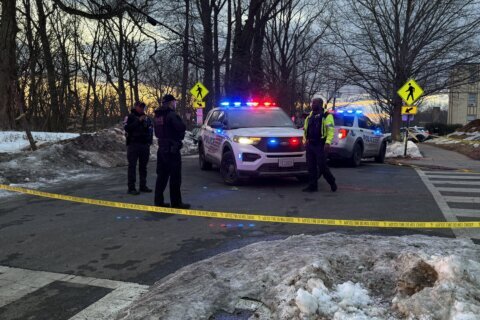The D.C. Council is expected to vote Tuesday on whether to make a former convicted murderer a member of the D.C. Sentencing Commission, which helps shape sentencing guidelines for judges in D.C. Superior Court.
Joel Castón, convicted of murder at age 18 before undergoing what his supporters called a remarkable transformation fueled by faith and education, was paroled in 2021, becoming the first incarcerated person to win elected office in the District. After winning the office, Council members appeared to tap Castón for a new role on the sentencing commission.
However, in a Jan. 2 letter to the council, U.S. attorney Matthew Graves voiced concern about the District’s crime rate and the connection Castón has to the city’s legal system.
“We stressed at our meeting on Dec. 6 that, if the D.C. Council wanted to stop this revolving door, it would have to name a commissioner who was inclined to do so and communicate to that commissioner that the D.C. Council wanted to reverse the trends that have brought us where we are,” Graves wrote in the letter.
Graves blamed current sentencing guidelines for creating a revolving door for those arrested and prosecuted, claiming Castón would work to further reduce incarcerations.
“While we recognize the nominee’s work while incarcerated — including his election as an ANC Commissioner while incarcerated at the D.C. Jail and being a voice on behalf of other incarcerated people in a jail — neither that work nor his lived experience as an incarcerated person renders him an expert in sentencing policy matters,” Graves said.
Graves pointed to a need for more voices on the sentencing commission, after citing “inadequate sentences” in 2022 — just 50 people received 10 years or more for felony offenses, according to the U.S. attorney, despite a reported 203 homicides that year.
“There very well may be jurisdictions whose current sentencing practices are leading to sentences that are greater than what is necessary to achieve the purposes of sentencing,” Graves said. “The data makes clear that the District of Columbia is not such a jurisdiction.”
Representation on the sentencing commission
While Graves pushed for a “more balanced” analysis of some legislation impacting convictions in the District, he also encouraged the city to consider broadening the commission to include representation from a police body.
“The officers of the Metropolitan Police Department have a front-row seat to the revolving door,” Graves said. “And they very much have a view that is not currently reflected on the commission.”
He also said the results of the commission’s work were unsurprising given the fact that the Sentencing Commission, if Castón is added, would see two voices affiliated with “an advocacy organization that is focused on, among other things, decarceration.”
Graves’ comments referenced the work of The Sentencing Project’s co-director of research, Nazgol Ghandnoosh, Ph.D., in an opinion column published in the Washington Post.
“The author of that op-ed is already a commissioner on the District’s Sentencing Commission,” Graves writes in the letter. “We expect that the nominee would presumably second the view that the practices described above — where nearly half those sentenced of felonies receive little or no periods of incarceration — ‘is a mass incarceration mess.'”
Ghandnoosh, unlike Castón, had her appointment made by D.C. Superior Court Chief Judge Anita Josey-Herring.
The commission has 17 voting members, with the Council, D.C.’s mayor and chief judge of the Superior Court each allowed at least one seat. Mayor Muriel Bowser’s appointee to the commission, as of Jan. 8, appears to be vacant pending an appointment by the reelected executive.
Despite comments from Graves that suggest a police voice is missing on the commission, the group hosts 5 nonvoting members. Those members include the appointed leaders of the D.C. police, Federal Bureau of Prisons and U.S. Parole Commission, as well as a person appointed by the D.C. Department of Corrections.
Castón has served as a fellow and consultant with the Justice Policy Institute since 2021, where he draws “on the wisdom of 27 years of direct involvement with the criminal justice system.
“Commissioner Castón works closely with D.C. government, policymakers, advocacy groups and organizations to change the culture of mass incarceration,” according to the nonprofit.
No other appointments to the commission have been announced. Castón would replace Molly M. Gill and serve a three-year term if approved.
A change to DC criminal justice
D.C. Council Chairman Phil Mendelson announced a broader plan to shift the way the District fights violent crime with the introduction of the “Evidence-Based Gun Violence Reduction and Prevention Act of 2023” to the council.
In a Dec. 20 letter, Mendelson cited several pieces of research and claims the bill would implement recommendations made in a 2022 strategic plan for reducing gun violence.
“This year alone, over 260 people have been murdered, and thousands more have been violently assaulted, robbed or carjacked,” Mendelson wrote. “We can and must do better to fight the scourge of violent crime and protect our residents.”
Mendelson’s act would require a biannual repeat violent offender report from the sentencing commission, which provides updates on case disposition and statistics on the number of repeat offenders. It also would authorize more civilian investigators in D.C. police ranks and make community violence prevention services available to those who are signed up for Medicaid — the latter is already implemented in states like Maryland, Illinois and Oregon.
“Taken together, the proposals in this bill would implement strategies that we know reduce violent crime and better focus our law enforcement efforts on holding violent offenders accountable,” Mendelson wrote.
During a Dec. 20 roundtable on Castón’s appointment, Castón said his tenure would be an incredibly serious duty for him.
“As a native Washingtonian who has been impacted by the criminal legal system, I am humbled to take on the critical responsibility that this position entails,” he said.
Castón said if confirmed, he would advocate for sentences that balance public well-being, accountability and human dignity.
“I ask of you for your confidence and support. I look forward to contributing to judicious sentencing guidance that promotes justice, compassion and a government for all people in Washington, D.C.,” he concluded.
WTOP has reached out to D.C. Council Chairman Phil Mendelson and four other members of the Council for comment on the nomination of Castón.
Get breaking news and daily headlines delivered to your email inbox by signing up here.
© 2024 WTOP. All Rights Reserved. This website is not intended for users located within the European Economic Area.









